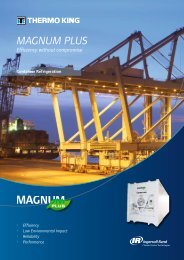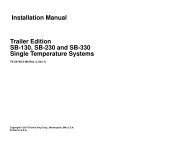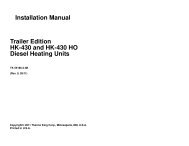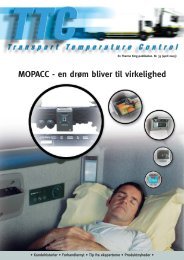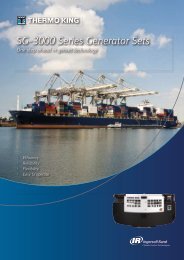The New President Of Ingersoll Rand Climate Control - Thermo King
The New President Of Ingersoll Rand Climate Control - Thermo King
The New President Of Ingersoll Rand Climate Control - Thermo King
Create successful ePaper yourself
Turn your PDF publications into a flip-book with our unique Google optimized e-Paper software.
Industry think tank and <strong>The</strong>rmo <strong>King</strong> determine<br />
the importance of return-air bulkheads:<br />
Optimum Refrigeration<br />
Performance, Improved<br />
Fuel Consumption,<br />
Minimum Environmental<br />
Impact<br />
“It was generally<br />
agreed that<br />
nothing currently<br />
on the market<br />
met all operator<br />
requirements.”<br />
9 TTC Q2 April 2006<br />
When Graham Eames joined <strong>The</strong>rmo<br />
<strong>King</strong> he looked at ways in which<br />
external resources could help<br />
operators improve the way their<br />
businesses were run, value customer<br />
service and reduce their costs.<br />
Many operators spent most of their<br />
time looking down and inwards,<br />
labouring to reduce margins and<br />
meet the greater customer demands.<br />
Having previously been part of a Think Tank on<br />
the truck side of the business, he proposed to a<br />
number of operators the introduction of a similar<br />
group for the UK industry.<br />
<strong>The</strong> result is a group of fourteen people made up<br />
of experienced, well-qualified Fleet Engineers and<br />
experienced, professional operational directors and<br />
managers. From the outset it was agreed that the<br />
Think Tank would meet three times a year to look<br />
upwards and outwards on behalf of operators,<br />
looking to utilise the combined experience of the<br />
team in finding ways of solving agreed technical or<br />
operational problems and, in doing so, take the<br />
industry forward.<br />
One of the first issues to be raised and dealt with<br />
by the team was that of return-air bulkheads. It<br />
was generally agreed that nothing currently on<br />
the market met all operator requirements and, in<br />
many cases, the bulkheads merely acted as an<br />
evaporator guard.<br />
<strong>The</strong> Optimum Return-Air Bulkhead<br />
During the course of 2005 the team put together<br />
a specification of what they believed to be the<br />
optimum return-air bulkhead, which would also<br />
be robust enough to act as an evaporator guard.<br />
<strong>The</strong>y established that return-air bulkheads are<br />
important for optimum refrigeration performance,<br />
improved fuel consumption and minimum<br />
environmental impact.<br />
<strong>The</strong> purchase of a refrigerated box of any size has<br />
one prime objective: to create an environment of<br />
airflow and insulation to maintain a set<br />
temperature for a required duration and so<br />
preserve the integrity of temperature sensitive<br />
products carried in it.<br />
To achieve best possible performance from the<br />
majority of refrigeration units, it is important to<br />
ensure that the airflow around the trailer cargo<br />
area is optimised. <strong>The</strong>rmo <strong>King</strong> carried out tests<br />
that confirm one very effective way of doing this<br />
is with a correctly designed and installed returnair<br />
bulkhead.<br />
<strong>The</strong>rmo <strong>King</strong> also carried out tests, which<br />
concluded that improved air circulation inside the<br />
trailer means temperature management would be<br />
at its best and that a significant percentage of<br />
refrigeration capacity would be lost by the use of<br />
an inappropriate bulkhead.<br />
While the tests were carried out using a <strong>The</strong>rmo<br />
<strong>King</strong> fridge, the principal remains the same for all<br />
temperature-controlled units, regardless of<br />
manufacturer.<br />
All in the Specification<br />
<strong>The</strong> Think Tank went on to agree that<br />
unfortunately many bulkheads are not specified<br />
correctly, if at all. This can be detrimental to the<br />
unit performance, creating reduced refrigeration<br />
capacity along with increased fuel costs and<br />
therefore emissions.<br />
<strong>The</strong> group listed a number of key points that<br />
operators should consider:<br />
• Robustness - This is an important feature<br />
as is its integration into the trailer design. <strong>The</strong><br />
operator should make his wishes on this clear to<br />
the body builder.<br />
• Pallet Stops - <strong>The</strong>se should be designed into<br />
the trailer body at the base of the return-air<br />
bulkhead and be strong enough to withstand<br />
an impact from a pallet on a moving two ton<br />
forklift. <strong>The</strong>y should be sited to provide air<br />
channels up to the bulkhead and cause no<br />
obstruction.



